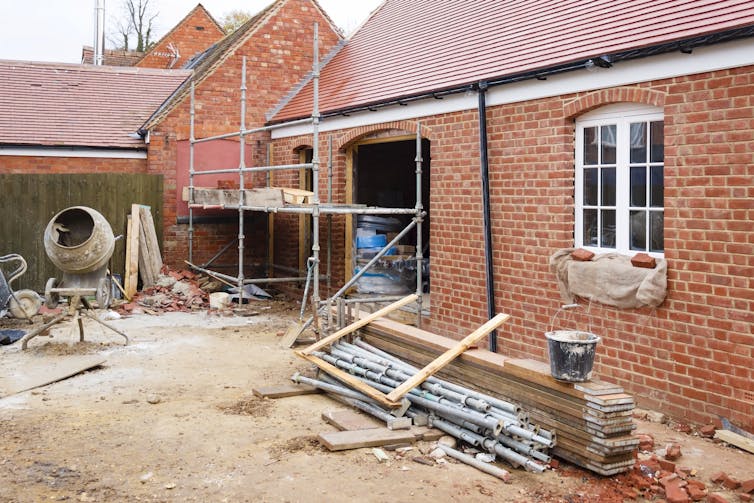When granny flats go wrong – perils for parents highlight need for law reform
- Written by Patricia Lane, Senior Lecturer, University of Sydney
A “granny flat agreement” is an informal arrangement between a parent and their adult child or children. The parent (often elderly) contributes funds to create granny flat accommodation either by modifying a home or by buying a suitable property in the name of the children. In return they agree to provide the parent with a lifetime right to live in the granny flat, or at least until the parent needs residential care.
Many of these arrangements work out well. The older person then enjoys the love and support of having their family close by as they age.
When an arrangement of this kind goes wrong, however, it can seriously threaten the wealth, autonomy and dignity of the elderly parent. If the relationship between the parent and child, or child’s spouse, breaks down and the parent is asked to leave the property, he or she may be left with nothing.
Read more: Flatting in retirement: how to provide suitable and affordable housing for ageing people
Read more: Co-housing works well for older people, once they get past the image problem
How does the law treat granny flats?
The parent’s only chance of recovering her contribution is to go to court. These court cases depend on applying a complex set of rules.
The parent must prove the contribution was not a gift but that they supplied funds as part of an arrangement that the parties would live together. Agreements creating interests in land need to be in writing, and usually there is no written agreement.
The court can apply equitable principles. A parent who contributed to improving the property ought to have the contributions back, or a proportionate share of the property returned if the arrangement ends prematurely, because it is unjust for children to retain the benefit of the contribution without providing the granny flat.
 A parent who made a contribution to renovations or extensions ought to get that back if living arrangements break down.
Paul Maguire/Shutterstock
A parent who made a contribution to renovations or extensions ought to get that back if living arrangements break down.
Paul Maguire/Shutterstock
Where the court finds that the parent relied on a promise by the child that the parent would have an interest in the house, or at least a right to live with the child for life, the child can be required to repay the contribution.
This often means the child must sell their house if they cannot refinance to obtain the money to pay the parent. If the parent is entitled to a share of the property, the house has to be sold to realise the parent’s share.
The problem for parents is that court cases cost money, unless Legal Aid is available, but only parents who are truly destitute qualify for assistance. The parent has to produce evidence of the arrangement or the promise. They often have to recount conversations from many years ago to prove there was an arrangement. The children have to spend money on their own lawyers.
Parents and children very rarely put these agreements in writing and almost never consult a lawyer. Sometimes, to help the child get finance, a parent may have told the lender the contribution was a gift.
All this makes court cases complex, difficult and expensive.
Read more: The Financial Services Royal Commission highlights the vulnerability of many older Australians
In New South Wales, the Property (Relationships) Act 1984 may apply to granny flat disputes, but the parent still has to show how they contributed to the child’s property. Other states and territories – including Victoria, South Australia, Tasmania and ACT – have similar laws for couples, which might apply to family arrangements. However, the NSW legislation is broader, which makes things worse for parents outside NSW.
When a dispute arises, the parties usually want to resolve the matter as quickly and as cheaply as possible. But court cases can take a year or more to get to hearing. Affidavits must be prepared and financial documents reviewed. During this time the parent may be living in emergency housing, often at public expense.
The picture gets worse if the child’s marriage breaks down. The parent’s claim then gets taken into family property proceedings between the child and their spouse in the Family Court or Federal Circuit Court. This can take even longer than going to the Supreme Court.
A better way to resolve disputes
Parties to these disputes need fast access to a system of practical rules for separating the parties’ property interests, and one that offers early mediation. These rules would cover factors such as increases in the value of the property, how long the parties lived together, what benefits they received, and other discretionary considerations. Such rules might provide the basis for a set of statutory guidelines for a tribunal to apply.
Civil and administrative tribunals emphasise informality and conciliation, so giving these tribunals jurisdiction to resolve granny flat disputes according to statutory guidelines would arguably be more efficient than going to the Supreme Court or Family Court.
 Parents and children who trust each other may be reluctant to get legal advice on a granny flat arrangement, but they really should.
Alexander Raths/Shutterstock
Parents and children who trust each other may be reluctant to get legal advice on a granny flat arrangement, but they really should.
Alexander Raths/Shutterstock
Parties really should seek legal advice on granny flat arrangements before they commit to the deal. But parents often trust their children and are optimistic that they can live together as a family. If a lawyer provides advice to an elderly parent individually and with an awareness of their client’s possible incapacity or vulnerability to undue influence, that gives all parties a chance to decide what they want to happen if the relationship breaks down.
Centrelink recognises granny flat arrangements, so parents’ contributions are not automatically treated as a gift. Gifting attracts an asset test under which the parent might be deemed still to have the funds contributed, which could reduce their pension.
The children can also be worse off if the Tax Office considers that the child accepting the contribution made a capital gain because the parents’ contribution increased the value of the home.
Although the Australian Law Reform Commission has looked at some aspects of this issue, action is need to reduce the complexity of existing equitable and statutory rules. Elderly parents should not have to take their children to court in expensive legal proceedings to retrieve the contribution that was meant to ensure they had a secure home in their later years.
Read more: We need more flexible housing for 21st-century lives
Authors: Patricia Lane, Senior Lecturer, University of Sydney




